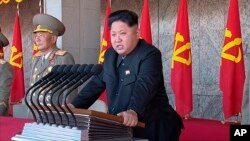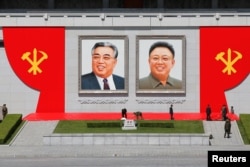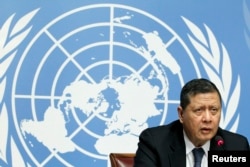North Korean leader Kim Jong Un is expected to receive a new title that would reinforce his absolute hold on power, while holding in check the influence of the military.
The young leader currently holds the titles of chairman of the ruling Workers' Party of Korea (WPK) and first chairman of the National Defense Commission (NDC).
In a closed-door session of the Presidium of the Supreme People's Assembly (SPA) scheduled for Wednesday, Kim is likely to be named chairman of a newly restored state apparatus named the Central People's Committee (CPC).
“If Kim Jong Un monopolizes the highest national position, followed by [the] highest position of the party, he will virtually become the highest leader of the regime,” said North Korean defector and analyst Ahn Chan-il with the World Institute for North Korean Studies.
The Central People’s Committee was created in 1972 to oversee the military as well as civilian governmental functions. Kim Il Sung, the country's late founder and the grandfather of the current leader, served as the head of the committee. But his son Kim Jong Il abolished the CPC during his rule and strengthened the NDC's role, prioritizing a "songun," or military first policy.
Kim Jong Un’s expected restoration of his grandfather’s power structure, analysts say, may diminish the influence of the military, and give greater voice to political advisers from the Workers’ Party.
In May, the North Korean leader also leaned toward his grandfather’s style of governing by convening the first Workers' Party Congress held in 36 years that was also seen as a move to bolster his power and push forward his agenda. His father Kim Jong Il retained his party titles as well as military ones, but never convened a party congress.
However in the authoritarian state of North Korea, parliamentary meetings serve to unanimously endorse decisions already made by the leadership.
Popular support
Since he assumed power in 2011, the young leader who is believed to be in his early thirties has set his own his "byeongjin" policy that prioritizes developing nuclear weapons and increasing economic development.
North Korea continued development of nuclear weapons and multiple missile tests under Kim Jong Un has increased tensions with the international community.
U.N. Security Council resolutions ban North Korea from developing nuclear weapons and ballistic missile technology. This year the U.N. imposed tough new sanctions after the North conducted its fourth nuclear test and launched a long-range rocket into space.
Pyongyang argues it needs nuclear weapons to deter or defend against a potential attack from the United States.
The Kim Jong Un government has also been under increased international criticism for alleged widespread and ongoing human rights atrocities that include operating a network of political prisons, systematic torture and executions.
But the North Korean leader’s defiant stance against perceived international pressure may also be generating increased support at home.
“The more pressure extended, exerted on the government of the DPRK (Democratic People’s Republic of Korea), the more the government is seemingly supported by the public,” said Marzuki Darusman, the U.N. Special Rapporteur on North Korea.
Economic fallout
Over time North Korea’s is expected to pay a high economic price for its defiant stance on nuclear weapons.
The international sanctions include suspending currency transfers and restricting the North’s lucrative mineral trade that had accounted for over half of the country’s $2.5 billion in exports to China alone.
Pyongyang this week proposed reviving inter-Korean negotiation to improve relations but Seoul rejected the offer, saying North Korea must first suspend its nuclear program before any talks can occur.
Youmi Kim in Seoul contributed to this report.











